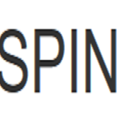We consider the problem of finding a near ground state of a $p$-spin model with Rademacher couplings by means of a low-depth circuit. As a direct extension of the authors' recent work [Gamarnik, Jagannath, Wein 2020], we establish that any poly-size $n$-output circuit that produces a spin assignment with objective value within a certain constant factor of optimality, must have depth at least $\log n/(2\log\log n)$ as $n$ grows. This is stronger than the known state of the art bounds of the form $\Omega(\log n/(k(n)\log\log n))$ for similar combinatorial optimization problems, where $k(n)$ depends on the optimality value. For example, for the largest clique problem $k(n)$ corresponds to the square of the size of the clique [Rossman 2010]. At the same time our results are not quite comparable since in our case the circuits are required to produce a solution itself rather than solving the associated decision problem. As in our earlier work, the approach is based on the overlap gap property (OGP) exhibited by random $p$-spin models, but the derivation of the circuit lower bound relies further on standard facts from Fourier analysis on the Boolean cube, in particular the Linial-Mansour-Nisan Theorem. To the best of our knowledge, this is the first instance when methods from spin glass theory have ramifications for circuit complexity.
翻译:我们考虑的问题是通过低深度电路找到接近地面状态的美元螺旋模型,与Rademacher的连接。作为作者最近工作[Gamarnik、Jagannath、Wein 2020]的直接延伸,我们确定,任何多规模美元输出电路,只要在一定不变的最佳性因子中产生一个具有客观价值的旋转任务,其深度必须至少为$@log n/(2\log\log n),随着美元的增长。这比已知的以美元/美元/美元/美元/美元/美元/美元/美元/美元/美元/美元/美元/美元/美元/美元/美元/美元/美元/美元/美元/美元/美元/美元/美元/美元/美元/美元/美元/美元/美元/美元/美元/美元/美元/美元/美元/美元/美元/美元/美元/美元/美元/美元/美元/美元/美元/美元/美元/美元/美元/美元/美元/美元/美元/美元/美元/美元/美元/美元/美元/美元/美元/美元/美元/美元/美元/美元/美元/美元/美元/美元/美元/美元/美元/美元/美元/美元/美元/美元/美元/美元/美元/美元/美元/美元/美元/美元/美元/美元/美元/美元/美元/美元/美元/美元/美元/美元/美元/美元/美元/美元/美元/美元/美元/美元/美元/美元/美元/美元/美元/美元/美元/美元/美元/美元/美元/美元/美元/美元/美元/美元/美元/美元/美元/美元/美元/美元/美元/美元/美元/美元/美元/美元/美元/美元/美元/美元/美元/美元/美元/美元/美元/美元/美元/美元/美元/美元/美元/美元/美元/美元/美元/美元/美元/美元/美元/美元/美元/美元/美元/美元/美元/美元/美元/美元/美元/美元/美元/美元/美元/美元/美元/美元/美元/美元/美元/美元/美元/美元/美元/美元/美元/美元/美元/美元/美元/美元/美元/美元/美元/美元/美元/美元/美元/美元/美元/美元/美元/美元/美元/美元/





